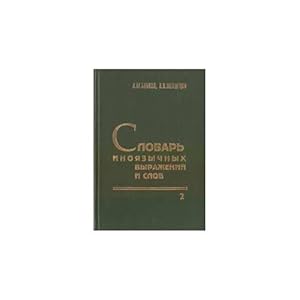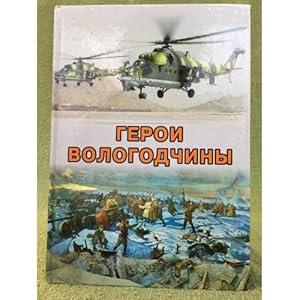BABKIN M V (6 resultados)
Tipo de artículo
- Todo tipo de artículos
- Libros (6)
- Revistas y publicaciones
- Cómics
- Partituras
- Arte, grabados y pósters
- Fotografías
- Mapas
-
Manuscritos y
coleccionismo de papel
Condición
Encuadernación
Más atributos
- Primera edición
- Firmado (1)
- Sobrecubierta
- Con imágenes del vendedor (3)
- Sin impresión bajo demanda
Ubicación del vendedor
Valoración de los vendedores
-
Slovar inojazycnych vyrazenij A-J i K-Z. 2. izd. 2 Bde.
Publicado por Leningrad Nauka Publ House -87, 1981
Librería: Zentralantiquariat Leipzig GmbH, Leipzig, Alemania
Miembro de asociación: BOEV
696; 654 S. OLwd. ru 0 gr.
-
Slovar' inojazycnych vyrazenij i slov. A-J i K-Z. 2. izd. 2 Bde.
Publicado por Nauka, Moskva, 1966
Librería: Antiquariat Robert Loest, Schwerin, MV, Alemania
Leinen, Goldschrift, guter Zustand.
-
Slovar' inojazycnych vyrazenij i slov, upotrebljajuscichsja v russkom jazyke bez perevoda. V trech knigach. T 1: A - D. T 2: E - M. T 3: N - Z.
Publicado por Sankt-Peterburg, Kvotam, ,, 1994
Librería: Antiquariat Gothow & Motzke, Berlin, Alemania
Libro
2., verbesserte Auflage (2-e izdanie, ispravlennoe). 3 Bände. 1344 S. gesamt / p. total, Zweispaltensatz/double columned, Originalkunststoff (publisher's plastic binding), gute Exemplare (fine), Fremdwörterbuch. 5-900183-01-7 (t 1: 5-900183-02-5; t 2: 5-900183-03-3; t 3: 5-900183-04-1). Sprache: russisch/mehrsprachig.
-
Slovar inoyazychnykh vyrazhenij i slov, upotreblyayushchikhsya v russkom yazyke bez perevoda. V 3 knigakh. T. 2-3 L
Publicado por SPb.: Kvotam, 1994
ISBN 10: 5900183017ISBN 13: 9785900183015
Librería: ISIA Media Verlag UG | Bukinist, Leipzig, Alemania
Libro
Hardcover/Hardback. Condición: New. Vo vtorom tome predstavleny slova na bukvy E-M.Predlagaemyj chitatelyam slovar yavlyaetsya ogromnoj kulturnoj tsennostyu Rossii.Pervoe ego izdanie bylo osushchestvleno Institutom russkogo yazyka AN SSSR v 1966 godu smekhotvornym dlya takogo gruda tirazhom 14200 ekzemplyarov. V silu etogo slovar davno stal bibliograficheskoj redkostyu.Slovar, o kotorom idet rech, prinadlezhit k tem knigam, kotorye v obyazatelnom poryadke dolzhny byt v kazhdoj kulturnoj seme. Etot slovar nuzhen shkolnikam, studentam, uchenym, deyatelyam iskusstva i literatury, voobshche vsyakomu cheloveku, lyubyashchemu russkij yazyk i zhelayushchemu znat o nem bolshe.Slovar predstavlyaet soboj obshirnyj svod inoyazychnykh zaimstvovanij, kotorye upotreblyayutsya v russkom yazyke v netransliterirovannom vide, t. e. na yazyke originala. Vklyuchaet v svoj sostav vyrazheniya, khodovye tsitaty i ikh fragmenty, terminologicheskie sochetaniya i slova-terminy. Slovar sostavlen na osnove kartoteki obemom bolee 125 000 kartochek-tsitat iz Biblii, proizvedenij antichnykh avtorov Aristotelya, Goratsiya, Gomera, Plavta i dr. , klassikov russkoj i zarubezhnoj literatury A. S. Pushkina, I. S. Turgeneva, Zh. -B. Molera, I. -V. Gete, Flobera i dr. , deyatelej nauki i iskusstva. Slovarnaya statya soderzhit perevod ili russkij idiomaticheskij ekvivalent inoyazychnogo vyrazheniya i, pri neobkhodimosti, ego tolkovanie. Dalee sleduyut grammaticheskaya i stilisticheskaya kharakteristiki, etimologicheskie svedeniya i istochnik proiskhozhdeniya. Illyustrativnye primery privodyatsya iz khudozhestvennoj, publitsisticheskoj, epistolyarnoj, filosofskoj i nauchnoj literatury XIXNr. XX vv. V kontse izdaniya pomeshchen Ukazatel, predstavlyayushchij soboj alfavitnyj perechen russkikh idiomaticheskikh ekvivalentov ili perevodov naibolee upotrebitelnykh inoyazychnykh vyrazhenij i slov, pomeshchennykh v slovare. Slovar adresovan shirokomu krugu chitatelej Nr. prepodavatelyam i studentam gumanitarnykh vuzov, lingvistam, perevodchikam, zhurnalistam, a takzhe vsem, kto stremitsya povysit kulturu svoej rechi.
-
Geroi vologodchiny. Entsiklopedicheskij slovar biografij
Publicado por INP FEST. Vologda. 2011, 2011
ISBN 10: 5905099030ISBN 13: 9785905099038
Librería: ISIA Media Verlag UG | Bukinist, Leipzig, Alemania
Libro
Hardcover/Hardback. Condición: As New. V knige chitatel poznakomitsya s kratkimi biografiyami Georgievskikh kavalerov, Geroev Sovetskogo Soyuza, Kavalerov ordena Slavy, Geroev Rossii - urozhentsev zemli vologodskoj.
-
Nash Vestnik. Literaturno-sportivnyi zhurnal Kruzhka Fizicheskogo Razvitiia KFR [Our Newsletter. Literary and Sports Magazine of the Physical Development Club]
Publicado por Vyshnii Volochek, Kruzhok Fizicheskogo Razvitiia KFR,, 1921
Libro Ejemplar firmado
Fun, absurd, art and sport in the first years of the URSS --- A fascinating magazine, fully written and drawn by hand, apparently created in this unique copy. With colourful and humorous illustrations. A very rare artefact of a creative self-governed society in provincial early Soviet Russia. From its inception, the newly formed Soviet government viewed sport "as one of the key factors in the construction of a new man and a socialist state. The country needed physically and mentally healthy people for hard physical labour in production and for the defence of the country against the enemy" (Sazonova, our translation here and below). The government therefore encouraged creation of various proletarian sports societies, and a system of specialised periodicals emerged to provide propaganda and organisational support for this process. In May-July 1922, The General Directorate for Universal Military Training published "two of the country's first centralised newspapers on physical activity and sport", 'Fizicheskaia Kultura' ['Physical Culture'] and 'Izvestiia Sporta' ['Sport News'] (Alekseev). The present magazine 'Nash Vestnik', created in this unique manuscript copy, surprisingly outpaces this mainstream production of sport-related periodicals in the USSR. Already in December 1921, a small football club based in Vyshnii Volochek in the Tver region, 300 km to the northwest of Moscow, created the first two issues of its newly founded magazine. The newsletter focused primarily on humorous sketches and absurd stories listing Pushkin, Tolstoy and Chekhov as the magazine contributors, together with a chief editor, "Professor of Black and White Magic, Adept of the Secret Sciences, Grand Rosenkreuzer of the Order of Malta". The issues included news about the club members breaking world records in different sports, humorous culinary recipes (for instance, a fried boot with moonshine), and absurd news from New York, London, Paris, Kyiv and the Caucasus. In January 1922, the club leaders V. Svetlishin, K. Babkin and D. Nyrkov expanded it into "Kruzhok Fizicheskogo Razvitiia" (KFR) ["Physical Development Club"] whose main purpose was to cultivate and promote all sports in their city and community because "in Russia, sport is still looked upon as just an entertainment". Despite the lack of funds, the club members organised multiple local championships, a lawn tennis court, junior tournaments, a gymnastics training group, and an ice skating rink. The next issues appeared later that year, in October 1922, with a new magazine concept, this time more sport-oriented and less anecdotic, focusing on the activities of the club and including artworks and texts by the club members, such as poems written in the style of neoclassical elegies or ancient Slavic bylinas about the benefits of sports, poetic portraits of club members signed by a "futurist", instructions (i.e. how to treat skies in different seasons), educational articles (about the history of Olympic games), and rebuses. Due to the lack of funds, the issues were again created in manuscript form and in only one copy each, for the club members' shared use. All the issues present in detail the club's achievements in sports, often in a form of engaging live reports of contests against other local clubs "Sport" and "KLS"; as well as distinctions of club members in sports and social work, and executive decisions, such as to fine different members for not showing up on mandatory duties or club events. At the same time, members of the club write in the empty parts of the issues their announcements (looking for musicians for the club's string orchestra) and complaints (reproaching club members for swearing too much or criticising different stories presented in previous issues). In every issue, the editors encourage members for a more active participation; some of the submissions are however unsuccessful, such as the poem "Rynochnoe razmyshlenie" ["Market Reflection"] by "Comrade K. V. Sosulin" who is recommended to "try to write in prose". Curiously, the magazine does not contain much ideology prevalent in most of the official Soviet sports periodicals. The issues were created by multiple club members and reflected their own interests, mostly devoid of political cliches and sometimes even mentioning pre-revolutionary Christmas and God, expelled from the new, socialist reality. Just a handful of artworks and announcements give subtle references to the non-sports events and broader historical context: one issue, for instance, includes a call to contribute to a charity lottery raising money for the starving ("remember how we were starving in 1918 and let's help others in need"). Overall an artefact of an exemplary Soviet self-managed peoples' society, 'Nash Vestnik' seems to have been the main platform for communication, documentation and structuring of the creative and sports activities of the KFR club, and possibly the youth at large of this small town. Each issue is illustrated with sketches and caricatures in pen, ink, pencil and watercolours, pasted or created directly on the pages; most of the covers have colourful images of a broad range of styles, from funny caricatures to dramatic, almost symbolist full-page illustrations. One of the issues is remarkable for its large folding representation of different sports practised by the club members. Some articles and essays include newspaper clips with photographs from international sporting events or relevant news. The collection also includes a contemporary photograph of all the issues of Nash Vestnik, a few loose drawn and printed materials (including brochures-portraits of the Soviet politicians Leonid Krasin and Mikhail Kalinin) and a diploma to K. Babkin for second place in cross-country skiing. In May 1923, the club counted a maximum of 60 members but in November the same year, it joined the larger "Tsentralnyi Rabochii Club" (TsRK) ["Central Work Club"] and finished its activities; TsRK also most likely dissol.





![Imagen del vendedor de Nash Vestnik. Literaturno-sportivnyi zhurnal Kruzhka Fizicheskogo Razvitiia KFR [Our Newsletter. Literary and Sports Magazine of the Physical Development Club] a la venta por PY Rare Books](https://pictures.abebooks.com/inventory/md/md31818751161.jpg)